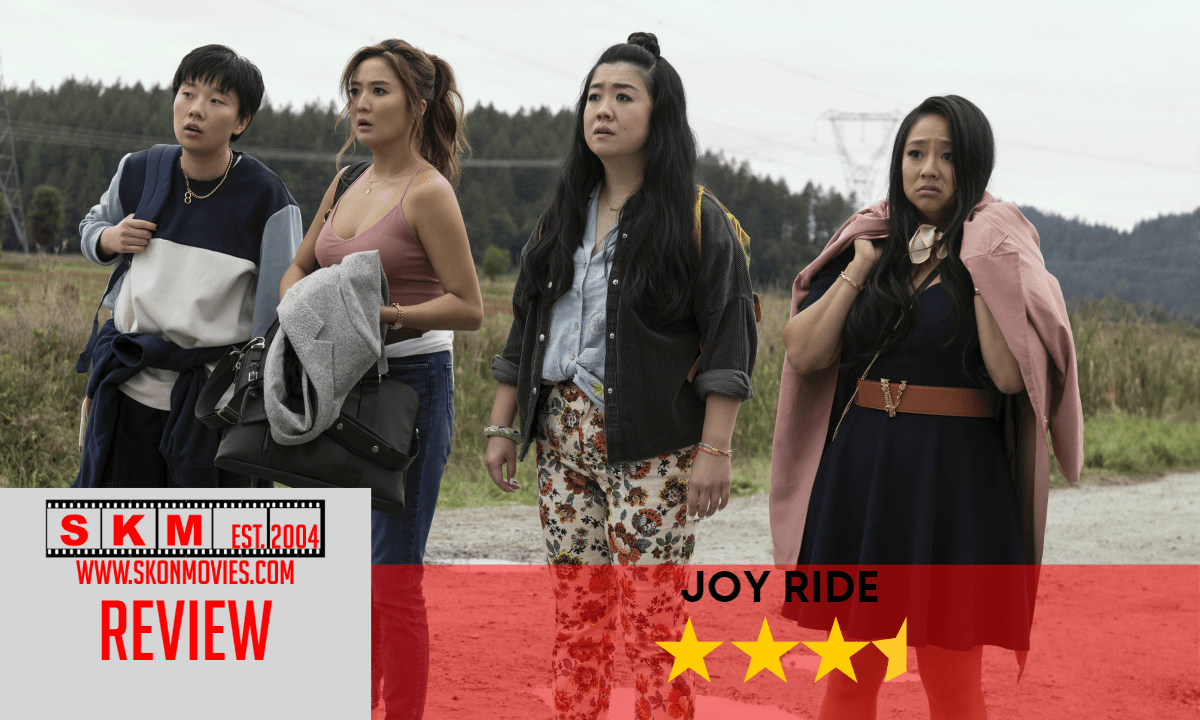Four Asian-American women go on a journey across Asia to locate one of their birth mothers in Joy Ride. Audrey (Ashley Park) is an Asian woman who was adopted as a baby by white American parents. As Audrey leaves on a business trip to Beijing, her childhood best friend Lolo (Sherry Cola) suggests that they track down Audrey’s birth mother via the adoption agency. Accompanied by Lolo’s odd cousin Deadeye (Sabrina Wu) and Audrey’s college roommate turned actress Kat (Stephanie Hsu), the girls travel across Southeast Asia in search of Audrey’s birth mother.
Joy Ride Synopsis
Joy Ride is the directorial debut from Adele Lim, previously best known as a screenwriter for Crazy Rich Asians and Raya and the Last Dragon. Produced by Seth Rogen and Evan Goldberg, Joy Ride is a raunchy comedy in a similar vein to films such as The Hangover, except that it stars an entirely Asian female cast. As an adopted daughter of white American parents, Audrey has a disconnect with her Asian heritage, despite growing up to become a lawyer. This is the opposite of her best friend Lolo, who works in her parent’s Chinese restaurant while creating promiscuous art pieces.
Audrey’s upcoming business trip to Beijing ends up being the perfect opportunity to find her birth mother, especially after she discovers her client Chau (Ronny Chieng) favours a connection with family. Accompanied by Lolo, Deadeye, and Kat, Audrey travels cross-country to the adoption agency in Haiqing to receive the location of her birth mother. Along the way, the girls get into many misadventures.
My Thoughts on Joy Ride
As a raunchy comedy, Joy Ride features several hilarious and politically incorrect set pieces. This includes being forced to hide the paraphernalia of an American drug smuggler (Meredith Hagner) on a train, a hilarious sex scene montage with members of a basketball team, and a performance of a risque J-pop song with a concluding sight gag you can’t unsee. As such, Joy Ride does prove that comedy does not really have cultural boundaries.
However, there are still some elements of Joy Ride that do not mesh with me. Particularly this involves the characterization of the character of Deadeye, played by Sabrina Wu. While never explicitly described as such, it is heavily insinuated that the character is Autistic, which includes her very odd behaviour (her first scene has her asking if it’s OK to bring lighters on board a plane) and she seems to have a bigger connection with K-Pop than interhuman connections, opting to participate in a dance-off during the aforementioned sex scene montage. While the character does open up other the course of the film, it is still hard for me, not the view Deadeye as anyone other than the “Token Autistic Character.”
In fact, all of the characters in Joy Ride can be described as a character type. Ashley Park (Emily in Paris) plays Audrey as the good girl focused on her career, while her best friend Lolo, played by comedian Sherry Cola, is the complete opposite. Then there’s freshly Oscar-nominated actress Stephanie Hsu (Everything Everywhere All at Once) as Audrey’s former college roommate Kat, who is supposedly reformed from her old promiscuous ways, as she prepares to wed her celibate acting co-star Clarence (Desmond Chiam).
Joy Ride eventually progresses into more dramatic territory as Aubrey learns some surprising truths about both her birth mother and the less-than-kind person she has been to her friends. I don’t want to get into too much detail about the final act of the film, though it does feature a very familiar face making a cameo. The catharsis in the third act does help Joy Ride to come together after getting a bit rocky towards the end of the second act.
Despite my personal issues involving its treatment of a possibly autistic character, I still found Joy Ride to be an often funny raunchy comedy that still has some heart by the end.

